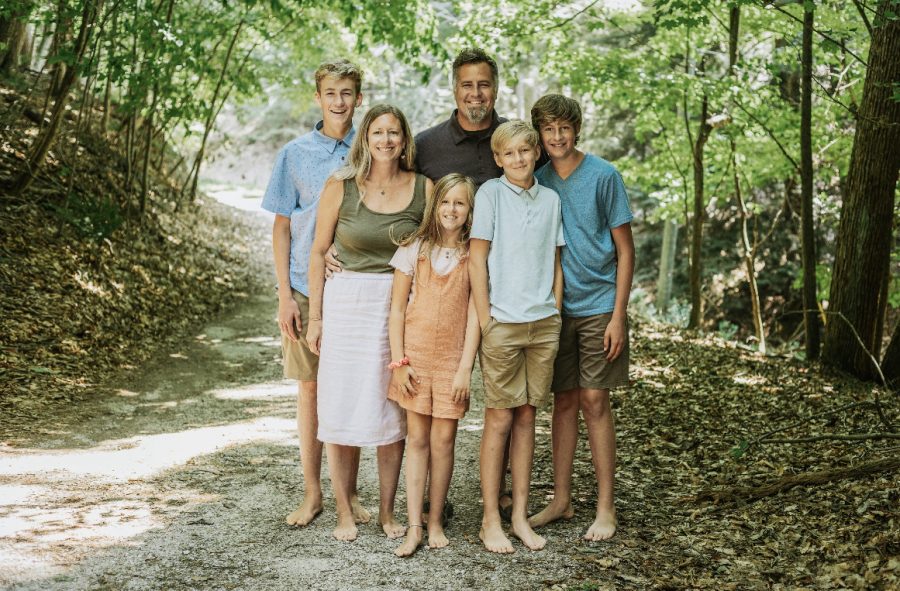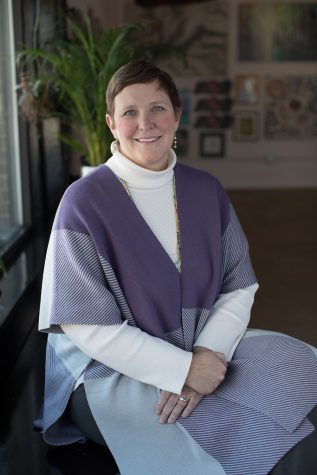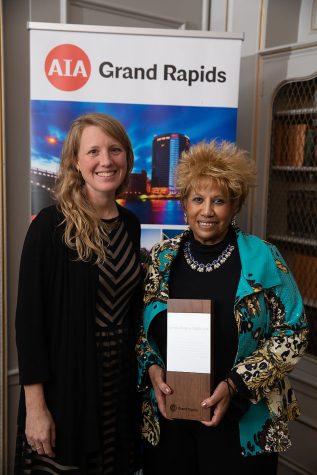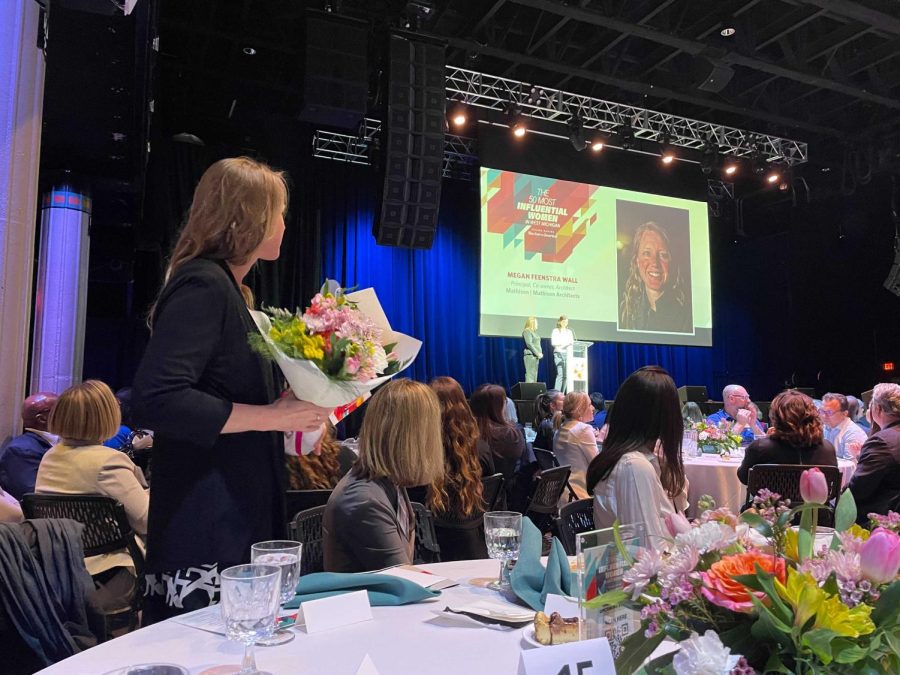Photo courtesy Megan Feenstra Wall
Three Calvin alumnae make list of 50 most influential women in West Michigan
March 20, 2022
Megan Feenstra Wall used to split her time between Calvin’s engineering and art departments, lugging her toolbox filled with pencils back and forth between the two.
But these days, she’s one of the women who are paving new trails in the field of architecture, which remains just one-quarter female in the United States, according to the American Institute of Architecture.
She is also one of the 50 most influential women in West Michigan, according to the Grand Rapids Business Journal.
Every two years, the GRBJ highlights the leadership of women across different fields. On March 10, Feenstra Wall attended the awards event, where she and two other Calvin alumnae were recognized for their work.
As the principal at Mathison Architects, Feenstra Wall has come a long way in recognizing her own influence. “I think a few years ago, I would have been like, ‘I don’t think I belong on that list,’” she said. “I didn’t realize my influence until the last few years that I had a voice; not only did I have things to say but people were listening.”
Michelle Van Dyke, president and CEO of Heart of West Michigan United Way, who’s received the award multiple times, experienced the impact of her work in a tangible way when another awardee and former employee approached her after the ceremony. Tracy Hornback is the CEO at Legacy Trust and previously worked for Van Dyke at Fifth Third Bank. “She came up to me after the ceremony yesterday and hugged me, and she said, ‘I owe it all to you,’” Van Dyke said.
Rachel VerWys, executive director at Safe Haven Ministries and a social work alum who has taught at Calvin as an adjunct professor, — a second-time awardee — recognized the importance of women supporting women. “As a female leader in the community, it’s just an honor to know that the work is part of a fabric of people. You know, it’s bigger than me,” VerWys told Chimes.

professor. (Photo courtesy Rachel VerWys)
“Law of obedience, grit and determination”
Van Dyke graduated from Calvin with a business economics degree in 1985, but she had wanted to be a banker since early elementary school.
Her journey to becoming CEO began when she was just seven. In her hometown of Shaker Heights, Ohio, Van Dyke took the rapid transit to the end line where her bank was. She deposited her birthday money and babysitting earnings, full of amazement and with a deep sense of intrigue caused by being in such an establishment. “I would tell my parents at the dinner table, ‘I’m going to own a bank one day,’ and, you know, they would laugh,” Van Dyke said.
And so it happened.
After graduating, Van Dyke joined Fifth Third Bank. She began as a branch manager trainee and was eventually promoted to president of the Fifth Third Mortgage Company.

Thirty years into her career with the bank, Van Dyke felt called to change paths. “Something was calling me to the nonprofit world and, you know, get to give back to the community that had given me so much,” Van Dyke said.
That was when the board chair of Heart of West Michigan United Way called her, as one of the obligatory CEO calls he was making to promote open positions. “He called me and he said, ‘would you ever consider running United Way?’ And I said, ‘you know, I would,’” Van Dyke told Chimes. The positive response took the caller by surprise; things moved quickly from there. Now Van Dyke has been leading Heart of West Michigan United Way, an organization that fights poverty in Kent County, for six years.
VerWys also felt called to her field from a young age. She graduated from Calvin with a bachelor’s of social work and a tailored minor in urban missions.
“I lived in the southeast side of Grand Rapids, in an urban community, and the intersections of different vulnerabilities that social work really addresses were part of my own life there in my neighborhood,” VerWys told Chimes.
In addition to what she described as “the understanding of life” she gained through that, VerWys saw her uncle, who was a social worker, finalize an adoption while she was in middle school. Those influences shaped her view of the field and inspired her to pursue it.
But her path to executive director of Safe Haven Ministries wasn’t linear.
“That summer after I graduated, I worked in a factory and stacked cubicle pieces all summer long,” VerWys said. After that, she and her husband, who’s also a social worker, took a two-year “Service and Training” position at World Renew in Southern California, to learn about community development. She then attended graduate school and helped found Kingdom Causes Bellflower to fight homelessness.
VerWys also works to fight human trafficking: “To be a startup in a grassroots organization doing advocacy and justice work is this law of obedience, grit and determination,” she said.
This sense of determination was also present in Feenstra Walls’ life. After graduating from Calvin with a degree in art and engineering and an art history minor, she worked towards getting her architecture license. Her career started during the great recession.
“One of the first things that people do when the money is gone is stop their building projects; so there were very few jobs in the profession,” she said. At the time, Feenstra Wall knew of one firm in Grand Rapids that was hiring, and through a connection to a principal who worked there –– and was coincidentally teaching business at Calvin –– she began her career.
‘Where were you?’
“As I grew older, I started to realize that I think I really was pushing myself into leadership positions because I wasn’t happy with the status quo,” Van Dyke told Chimes.
About half of architecture graduates are female. Yet, as of 2019, women made up only about 25% of licensed architects.
“So somewhere between graduation and licensure, which takes 10 years, women just drop out,” Feenstra Wall said. This percentage is even lower when considering people of color: “We’re at like 2% of licensed architects are Black and that’s embarrassing,” Feenstra Wall told Chimes.
Feenstra Wall felt the gender disparity in the profession in her personal life.
Feenstra Wall has three children: a nine year old son and two six-year old daughters. When her twins were about one year old, she felt lonely in her profession. She knew more and more women were entering the field but knew few of them who were from her generation.
“So I actually started seeking them out; I went on to the website of the state licensing board and I found all the female-sounding names and I ‘Google-stalked’ them,” Feenstra Wall said.
“I got a lunch sponsored by a builder and these women showed up and I was just like, ‘Where were you?’ And I made some really good friendships through that process,” she said.
‘People were listening to me’
For each of these women, being in leadership entailed different challenges in their careers: both as they asserted their space in their positions and came to terms with their own leadership styles.
Van Dyke is the first female bank president in Grand Rapids. “So that was a trail to blaze, so to speak. While it did not deter me and I was excited about it, you know, it’s not easy to look around and be the only woman in the row,” Van Dyke said.
“We tend to look towards this traditional leader as sort of this male, loud, forceful, pushing type and I don’t think that’s what real leadership is,” Feenstra Wall told Chimes.

Feenstra Wall remembers a meeting she led a couple of years ago that opened her eyes. As she noticed people’s receptiveness to the resources she recommended, she knew her authority was being valued.”I suddenly realized that people were listening to me,” she said.
“It took me forever to understand that I didn’t have to change myself to fit someone else’s mold of who a leader is. If I had figured that out sooner, I think I could have started working on my own strengths and weaknesses,” Feenstra Wall said.
Family also played a role in these women’s leadership. “I have been working full time all of my career so my husband actually is a stay-at-home dad and stayed home from the time when our oldest turned a year and a half,” Van Dyke said. She said his support is critical.
“I have had people look at my resume and be like, ‘Oh, it’s kind of flexible’; And that wasn’t necessarily a compliment that they intended to give me,” VerWys said, thinking of the choices she made through her career to best manage her work life and family development.
“Now my resume says I am an amazing carpool facilitator, because I work with eight families to figure out how my four kids are going to get to and from school every day. And that organization happens before I even get to the office every day,” VerWys said.
“It’s 2022 and I still struggle with the fact that people always ask me if I stay home with my kids, or what does my husband do; it drives me crazy,” Feenstra Wall said. Her mother, who taught at Calvin, played an important role in the way she viewed women leadership. Seeing her mother complete her PhD while she was in middle school impacted her more than she realized at the time.
“I think it’s a gift to know that there are so many women who have gone before us,” VerWys said. “You’ll, along your journey, have opportunity to do things that feel out of the box; and those are sometimes the best experiences.”
Reflecting on her own experience, Van Dyke said: “I tell women, if you’re able to, take the risk, because it will pay off.”
